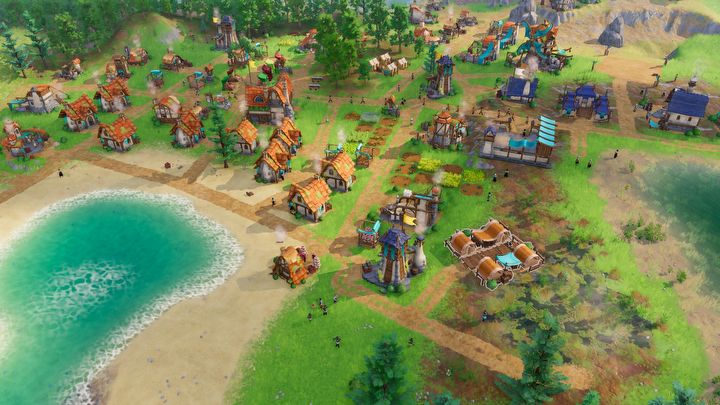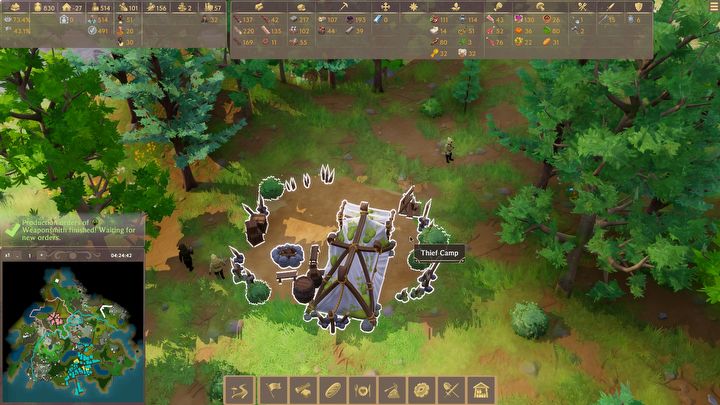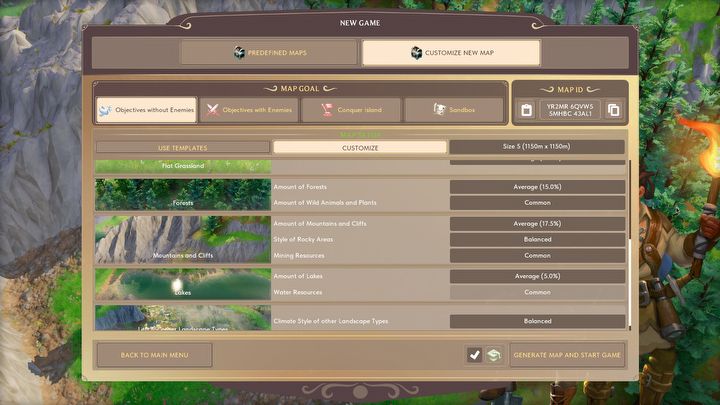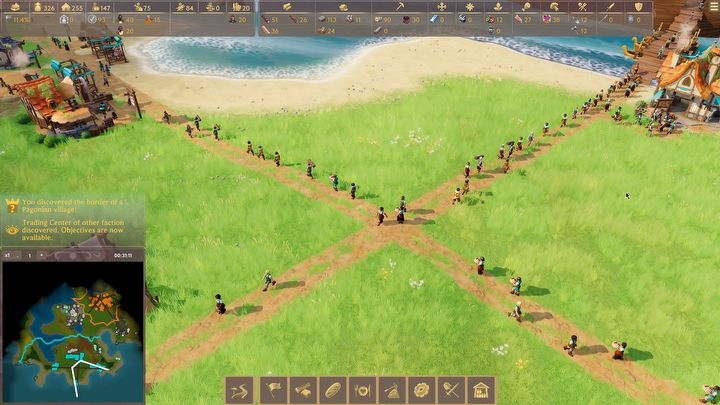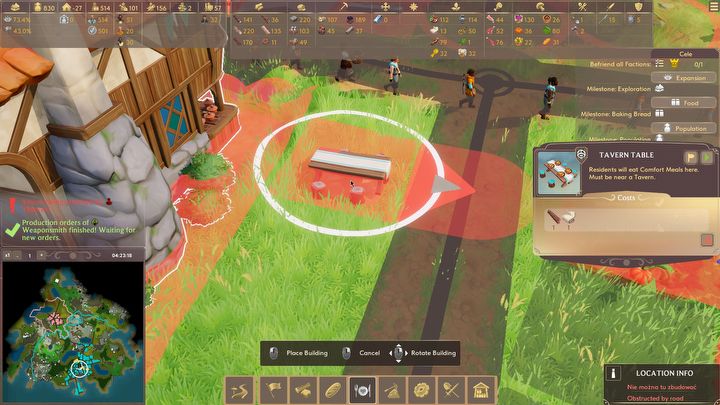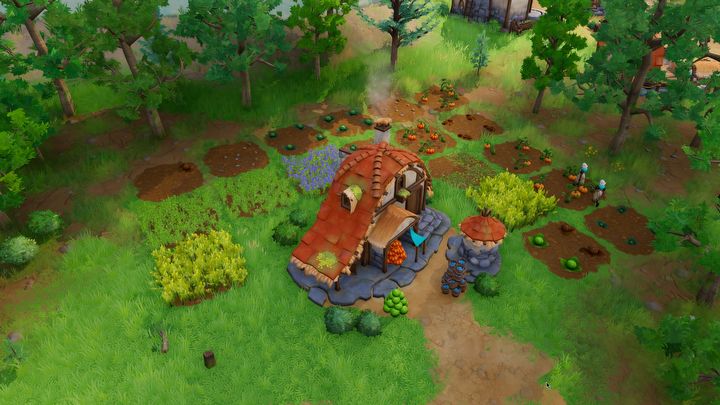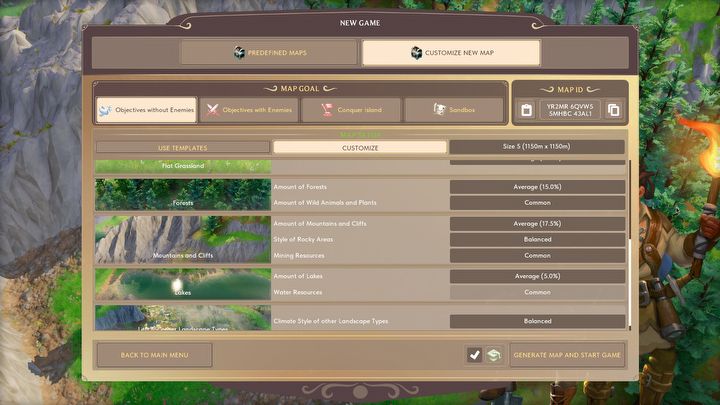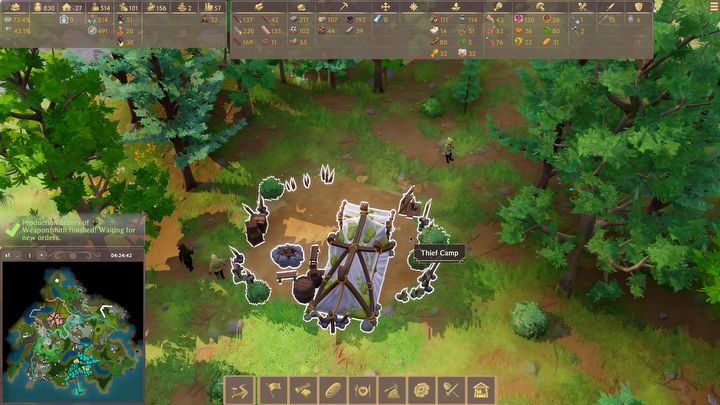Maybe the New Settlers Weren't Bad, Maybe It Was Just Me? Pioneers of Pagonia Seemingly Confirms That
If you've expected a love letter to The Settlers, praising the new installment's amazing quality, I'm afraid I don't have good news. Pioneers of Pagonia for now seems correct at best. It's pleasant, but nowhere near groundbreaking.
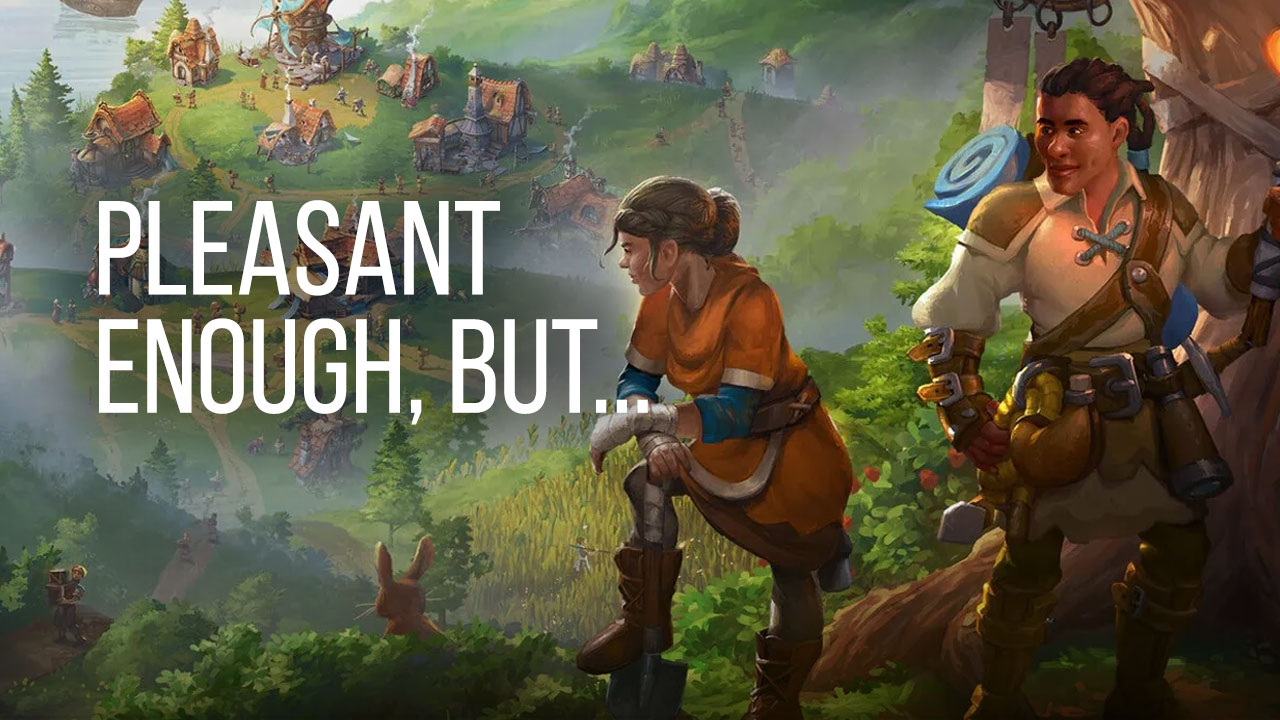
The Settlers. If you were wondering how long it would take before I refer to this iconic game series, here you go – from the very first word. However, this is the natural order of things. Pioneers of Pagonia is a game developed by Volker Wertich, the "father" of The Settlers, who was not only responsible for the first installment of this series (and co-created The Settlers III), but also defined, to some extent, the entire genre. And now he decided to do something brand new.
I played the demo of Pioneers of Pagonia during the Steam festival where it was made available. The version was unfinished in many aspects, but that was the intention – after all, we were meant to see the current state of work rather than enjoy a complete title. I wasn't really drawn into the gameplay at that time, and after trying the demo, I would rate the game somewhere between 5-7/10.
How does the game look now, at the start of early access? There's definitely more content, including a completely refined system for map selection and generation. However, one thing remained unchanged – I still wasn't captivated by the game. At the moment, it's average, and I don't think the final product will be competing for game of the year. Although the game is enjoyable, I would currently rate it between 6-7/10.
EARLY ACCESS!
Games in Early Access often undergo dynamic development and may experience turning points where certain elements can be completely changed. The information available here reflects the status as of December 12, 2023. If, for instance, you are missing something and waiting for it to be introduced – check the update description on Steam, where all changes should be listed.
Before we delve into the specifics, I'd like to bring up the Settlers series. This is important because without the context, if we evaluate Pioneers of Pagonia as a completely distinct game, we end up with an unremarkable average game. However, when the father of the genre and the iconic game series creates this mediocre game, it's worth taking a closer look and checking if he doesn't have an ace up his sleeve. (Spoiler alert: Unfortunately, he doesn't).
Settlers: The Fall
The story of the Settlers is a sad tale of power, glory, fame and slow decline. A story in which, unfortunately, there's nothing exceptional. A similar thing happened to SimCity, and this example is quite significant. Because on the ruins of the disastrous SimCity from 2013, which basically buried the entire, 24-year history of the series, Cities approached the matter with a new perspective and enthusiasm. Currently, the series is having a crisis after less-than-perfect Cities: Skylines 2, but that's a story for a completely different text. You can read our review here.
In the case of The Settlers, the interesting thing is that, in theory, a game created by the same man who started the original series could be a new opening for the genre and become the heir to an old tradition.
But when did the Settlers actually fall from grace – and why? There is essentially no objective answer to the first question, because individual installments of the series have their dedicated fans who claim that this game is the best. Personally, the game I remember most fondly in the series is The Settlers II, the cult part with which I spent most of my youth – first in the original version, and then in The Settlers II: 10th Anniversary. Part three from 1998 is also highly appreciated and I actually have the impression that it was the moment, when the slow decline of this series began. And while I remember his seventh installment from 2010 quite positively and had a good time playing it, it was a game of a completely different caliber than my beloved part two, much less free and not offering as much fun.
This year's The Settlers: New Allies was created 13 years after The Settlers 7 and although it looks quite nice, it's simply shallow, and on the day of its release, it was in terrible technical condition. You can actually read about it in a review. In a word: epilogue. And then, the "Pioneers" show up on the horizon, trying to wink at fans of the classic series (even with details like the boundary stones marking our territory).
Pioneers of Pagonia – a classic of the genre, with all its consequences
Pioneers of Pagonia is a game in which we arrive with a quite large group of settlers on a new map and have specific goals to achieve in order to win the game. Regardless of these goals, the development of the settlement and providing the residents with necessary tools and food is essential, and in some cases, safety matters as well.
Every time, we have the same buildings available, although it's worth adjusting our plans to the environment. A map with a dense forest will allow for quick wood gathering, so there's no sense in building a forester's house. In turn, the area with a vast plain with fertile soil is best designated for agricultural fields, with gathering and hunting treated as secondary.
In the game, we do not control nor command any unit directly. We can only give orders indirectly. So we can, for example, designate a work area for lumbers, but we won't order a specific lumberjack to cut down a specific tree. The same goes for the military – we can designate areas for patrolling or exploration targets, but the movement of units is already beyond our control.
Currently, we have several predefined maps with default goals available and this has been done quite well. There are peaceful scenarios as well, when we won't find any enemies on the entire map, but otherwise, investments in the military will be necessary. Many players will probably be pleased that there's also a map generator, which allows for quite a lot of freedom. We have 9 biomes and quite a large possibility for customization. In the main menu, we simply choose whether we want to fight and on what terrain to play. The advanced settings tab, on the other hand, allows you to specify what area fertile soils or forests should cover, how many enemies we want, how difficult they'll be, etc.
Production chains are probably key elements of gameplay for many. Well, here... they just exist. In recent years, we have received so many fascinating games entirely about production chains that here, turning wood into spears or single types of food into meals does not seem impressive. Recruiting soldiers is probably one of the hardest tasks, but a simple chain of mines, forges, an armorer, and a quartermaster is enough for this. On the one hand, everything seems clear and quite logical, on the other – it's kind of bland.
Logistics can be annoying, but a large number of settlers allows for effectively solving all problems with the "brute force" method. You need to build something at the other end of the settlement and need 50 units of various goods for this? No problem, you just need... 50 settlers. Watching the settlement often resembles watching an anthill, with lines of residents going from the sawmill to the construction site. I even managed to jam one intersection – I don't need Cities: Skylines 2 anymore!
Technically, it's quite good for this stage of development.
Testing a game in a pre-release version (meaning before early access) is a challenge. Usually, things turn out to be highly dynamic and an element that could completely ruin my experience could be fixed literally the day after I publish the text. This applies particularly to technical issues and bugs, as these can be patched more spontaneously than, for example, adding new mechanics, which are introduced according to a certain schedule.
Pioneers of Pagonia seems to be a technically mature product, in which I haven't encountered this type of bugs. Not only serious ones, but I didn't notice any technical errors either – the game didn't freeze, the frames didn't drop, there was no problem with long loadings or inactive buttons. So, for a moment before early access, it's very correct.
I tested the game on a computer equipped with an Intel Core i7-9700K processor, MSI GeForce RTX 2060 Ventus OC card and 16 GB of 2666 MHz RAM, that is, a device offering moderate performance. The hardware requirements for this production are very low – a minimum of a GTX 1050. There's also a note that Intel's integrated graphics systems are not supported, which may disappoint those who were hoping to run this title, for example, on office computers.
My only complaint is the menu, which for now looks like a placeholder. The raw, angular buttons are accompanied by ugly color schemes, which seem to have been chosen mostly randomly. And this size – by default, the interface after starting the game is so tiny that I had trouble navigating and reading the text. And we can even make it smaller! My happiness and comfort started to appear somewhere around 125%.
Build your own settlement – edition nine, accelerated
I can't get used to the scale of the project of building a settlement in Pioneers of Pagonia. On the one hand, we literally start from scratch, setting up the first lumberjack's hut and the first house, on the other hand – we have 150 settlers. Even at the highest level of difficulty, there are initially as many as 75 of them! As I mentioned before, the answer to most problems is sending legions of people, whether for transport or for construction.
But wait, wait, we also have to feed them! There must be a catch here, since there are so many, right? Well... not really. Let my first approach to the game serve as an example – I chose a standard scenario with some enemies and 150 of my own settlers. I set up a hunter's hut, then a gatherer's hut to also collect forest berries, then a farm... and I actually forgot about food production for a good hour. I built the next farms more for the visual effect than out of necessity.
The warehouses currently seem a problem. Only the smallest ones are available, resembling a basic warehouse in Timberborn – useful as a handy storage space, but they will not ensure production flow alone. The announced introduction of larger variants will likely be one of the more significant changes for gameplay comfort.
At the current stage of development, after about 3 hours, I had all the buildings set up, and the only task left for me to complete the map was the trade task, which could probably have been completed earlier, but it was sometimes barely readable for me. At the same time, 3 hours of session time can go faster – we have play using normal speed or increase the pace fivefold.
So, realistically, on a standard map, after about 1.5 hours you will reach the place where you have built everything and you are at most waiting for some commerce goals to be achieved in order to win the session. On larger maps, where we have, for example, chosen to exterminate bandits, the game extends naturally. But although the scale will be larger, the depth will not. We will simply set up more forges to have more military to man more towers.
Of course, it's possible to configure the game to be more challenging – especially werewolves combined with a smaller number of settlers will help. Then indeed, the initial stage will be a race against time and counting on merciful RNG when generating resources. We'll start to feel like we're always short of people, tools, or resources, and that we have to fight for our place in this unfriendly world.
I really miss descriptions in the combat system. We have various enemies and different units, but we actually have no idea what they do and what kind of combat efficiency they have. Short descriptions when hovering over the recruitment menu or clicking on an enemy would be helpful. What distinguishes the forest ranger in the watchtower from the worker in the forester's lodge? And who, for heaven's sake, are "Fearnaughts"?
Currently, Pioneers of Pagonia seems like a game to play once in a while, play a full session, and then forget. Its mechanics appear outdated and unable to keep pace with the rapidly evolving genre. Although it might just be me being outdated and grumpy, perhaps it comes with age.
This is just the beginning
What does it mean that the game is now in Early Access? At present, this concept is extremely broad. There we will find great, mature games that have been able to engage with players at this stage. Against the Storm, which was developed for about a year before being officially released in its complete version, can serve as an example.
What about Pioneers of Pagonia? Well, it's hard to say. The developers appear to be motivated and dedicated, and we can also observe the progress of the current version in comparison to what we were able to test in the demo released this year. I approach every early access game with caution, as there's always a risk of the game getting stuck and entering an endless stage of development. Some titles have been in Early Access for several years, either practically abandoned or progressing incredibly slowly. At the moment, however, it seems that things will move more quickly.
The developers have announced the initial significant wave of new features and changes, scheduled to be released in the first quarter of 2024. We'll receive new objectives, a fisherman's cabin, productivity information, open-pit mining, an expanded warehouse, and a collaborative mode. Some new features, such as the fisherman's hut, probably won't have a significant impact on the gameplay. However, the cooperation mode can be a crucial factor in determining the success of the game, particularly if solo play becomes dull quickly.
According to the statement from the developers, the early access is expected to last "at least 6 months," although this will, of course, depend on the progress of work and the feedback from players.
It's not about the genre, it's about us
Pioneers of Pagonia is a good game that came at a bad time. In recent years, survival builders (I still insist on the term "village builder") have significantly grown, largely meeting the needs of fans of games with dynamics similar to Settlers. Without looking far, I will mention such titles as Frostpunk, Timberborn, Banished, Farthest Frontier, Foundation, Fabledom, Against the Storm, Kingdoms and Castles, Patron...
Many of these games provide highly intricate mechanics with multi-level production chains and a complex system of goods and services. They often also include something that makes them unique – a beaver settlement, the impending winter of the millennium, classic fairy tale motifs, towers that can be extended almost endlessly, and so on. I currently don't see any such element in Pioneers of Pagonia. It's just a game. Unfortunately, at this moment it is just one of many, not attempting to distinguish itself from the crowd in any way other than the developer's name.
FROM THE AUTHOR

I really enjoy constructing things in games. There has been a significant increase in the number of different types of builders in early access in recent years, including niche indie games. Many of them are total duds, but there are also quite a few titles that can provide numerous hours of enjoyable entertainment.
Farthest Frontier is my top choice, as it requires managing food supplies and defending against attacks, while also allowing for long-term gameplay and the gradual development of a perfect settlement. I recently spent almost 100 hours on one playthrough, and only then did I feel like I finally knew everything about the game.
